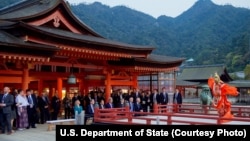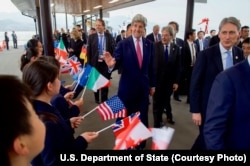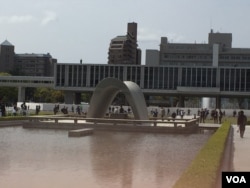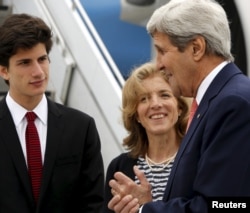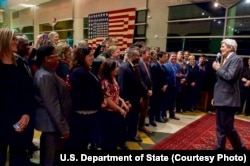U.S. Secretary of State John Kerry and other Group of Seven foreign ministers on Monday, the second day of their meeting in Hiroshima, visited Peace Memorial Park, a World War II memorial.
The U.S. dropped an atomic bomb on Hiroshima, which led to the end of the war. The bombing resulted in the deaths of about 140,000 people. Three days later, the U.S. dropped a second bomb on the Japanese port city of Nagasaki, killing about 70,000 people.
Asked if Kerry, the first U.S. secretary of state to visit Hiroshima, would apologize for the U.S. decision to bomb the city, a senior State Department official said, “No.”
“There is no effort on the part of the people, the government of Hiroshima, the government of Japan to seek an apology from the United States,” the official said.
The official said both countries were “firmly focused on what is important,” which is the future and ways for both countries to work together to secure that future.
Global security, the refugee crisis and political instability were focal points of discussion Sunday for the first day of the two-day ministerial meeting in Japan.
In an interview with a Hiroshima newspaper (Chugoku Shimbun), Kerry said most global threats to international peace require collective action.
"Gatherings, such as this one are important opportunities to help us address urgent international political and security concerns and to speak with one, clear voice on concrete actions needed," said Kerry.
The Group of Seven industrialized countries also includes Britain, Canada, France, Germany, Italy and Japan.
Kerry's visit to the country is also designed to lay the groundwork for President Barack Obama's May visit to Japan to attend the G-7 leaders’ summit.
President Obama has said he would be “honored” to visit Hiroshima, but has not done so during several trips to Japan while in office.
Several dozen protesters gathered near the Hiroshima memorial Sunday to protest the presence of the G7 meeting and G7 countries that had possessed nuclear weapons.
Kerry traveled to Hiroshima from Kabul, where he discussed issues including regional security and the status of efforts to hold peace talks with the Taliban. Kerry met with President Ashraf Ghani and Chief Executive Abdullah Abdullah.
U.S. officials say several rounds of explosions erupted nearly 200 meters from the U.S. embassy in Kabul shortly after Kerry departed. There were no injuries and no immediate indication that Kerry was a target.
Kerry is on a week-long tour of the Middle East and Asia that also included stops in Bahrain and Iraq. After Japan, he will attend a trade event in California before returning to Washington.




